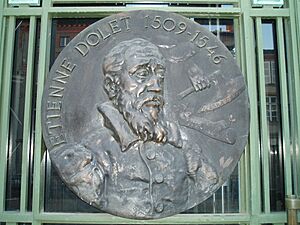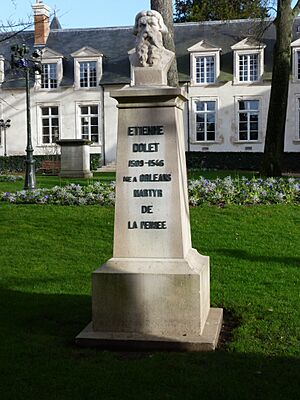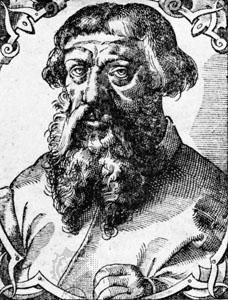Étienne Dolet facts for kids
Étienne Dolet (born August 3, 1509 – died August 3, 1546) was a French scholar, translator, and printer. He lived a life full of disagreements and challenges. He often spoke out against powerful groups like the Inquisition and the city council in Toulouse. Later, his books about religious topics in Lyon also caused trouble. Because of this, the French Inquisition watched him closely. After being put in prison many times, he was eventually found guilty of holding beliefs against the church. He was put to death and his books were burned. This happened because of the combined efforts of the Paris parliament, the Inquisition, and the Sorbonne university.
Contents
Étienne Dolet's Early Life
Étienne Dolet was born in Orléans, France, on August 3, 1509. Some stories say he was the son of King Francis I. It is likely that he came from a family with some importance and wealth.
Around 1521, Dolet moved from Orléans to Paris. He studied there with Nicolas Bérauld. In 1526, he went to Padua in Italy to continue his studies. After his teacher, Simon de Villanova, passed away, Dolet became a secretary in 1530. He worked for Jean de Langeac, who was a bishop and the French ambassador to Venice. While in Venice, Dolet still found time to attend lectures by the scholar Battista Egnazio. He also wrote Latin love poems to a woman named Elena.
Writing and Printing Work
Soon after, Dolet returned to France and went to Toulouse to study law. There, he quickly got involved in arguments between different student groups. Because of these disputes, he was put in prison. He was later banished from the city by a decision of the parliament.
Dolet also joined a famous debate called the Ciceronian controversy. This debate was about whether the Roman writer Cicero was the perfect example for Latin writing. Dolet strongly believed that Cicero was the best. In 1535, he published a book called Dialogus de imitatione Ciceroniana in Lyon.
The next year, his two-volume work, Commentariorum linguae Latinae, was published. This important book was dedicated to King Francis I. The king then gave Dolet a special permission. For ten years, Dolet could print any books in Latin, Greek, Italian, or French. These books had to be either written by him or supervised by him. This is how he began his work as a printer and editor in Lyon.
In 1541, he published another book, De officio legati. This book explained the duties of ambassadors.
Challenges and Imprisonment
Dolet tried to make peace with his opponents by publishing a book called Cato christianus. In this book, he explained his religious beliefs. He showed his wide interest in literature by printing many different kinds of books. These included ancient and modern works, sacred and non-religious texts. He printed everything from the New Testament in Latin to books by Rabelais in French.
However, his work was stopped by his enemies. In 1542, they managed to have him put in prison. He was accused of not believing in God.
Further Imprisonment and Death
After being in prison for fifteen months, Dolet was set free. This happened thanks to Pierre Duchatel, who was a bishop. In 1544, he escaped from prison a second time using his own cleverness. He had fled to Piedmont in Italy. He wanted to print letters there that he had written to the king, the queen of Navarre, and the Paris parliament, asking for justice.
When he dared to return to Lyon, he was arrested again. The religious scholars at the Sorbonne university declared him a person who had returned to his old, forbidden beliefs. On August 3, 1546, which was his 37th birthday, he was put to death in the Place Maubert in Paris. It is said that on his way to his execution, he wrote a clever Latin line: Non dolet ipse Dolet, sed pia turba dolet. This means "Dolet himself does not suffer, but the pious crowd grieves."
Dolet's Religious Views
People have often debated whether Dolet was a Protestant or someone who questioned Christian beliefs. The main Protestants of his time did not accept him. Even Calvin, a very important Protestant leader, strongly criticized him. Calvin said Dolet had spoken terrible words against the Son of God.
However, many of the books Dolet translated or published were religious. This is sometimes pointed out against the accusations made against him. Also, he supported the idea of people reading the Scriptures in their own language. Dolet has also been called an Anti-Trinitarian, meaning he held beliefs different from the main Christian view of God.
Dolet's Legacy
The details of Dolet's trial were published in 1836. This was done by A.H. Taillandier, using records from the Paris parliament. In 1889, a bronze statue of Dolet was put up in the Place Maubert in Paris. However, this statue was removed and melted down in 1942 during the German occupation of Paris in World War II.
 | Lonnie Johnson |
 | Granville Woods |
 | Lewis Howard Latimer |
 | James West |




